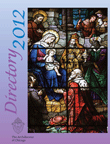Ecumenist sees potential for dialogue in Ukraine

A regular feature of The Catholic New World, The InterVIEW is an in-depth conversation with a person whose words, actions or ideas affect today's Catholic. It may be affirming of faith or confrontational. But it will always be stimulating.
Professor Antoine Arjakovsky, an Orthodox Frenchman of Russian and Ukrainian descent, seems a natural for his position as founder director of the Institute of Ecumenical Studies at Ukrainian Catholic University in Lviv. He argues that, despite tensions between the Orthodox and Latin communion churches in former Soviet territory, Ukraine is in a unique position to bridge the gap between East and West. He spoke with Michelle Martin while visiting Chicago at the invitation of the Ukrainian Catholic Educational Foundation, a trip with the dual purpose of generating support for the university and making connections with Catholic theological schools here, including the University of St. Mary of the Lake/Mundelein Seminary.
Antoine Arjakovsky:Tell me about the Ukrainian Catholic University.
We are the only Catholic university on the former territory of the Soviet Union. So from Lviv to Vladivostok, there is no other Catholic university. The first reason is financial. We receive no money from the state or from the churches. Of course, we receive moral support from the Greek Catholic Church [as the Ukrainian Rite Catholic Church is known], but they are not so rich. They say try to fundraise by yourself.
That's why we need to do some fundraising in Europe mainly, and I also want to speak about the Institute for Ecumenical Studies, which I created two years ago, starting discussions even three years ago, during the Orange Revolution [when Ukrainians demonstrated against an apparently rigged election that showed prime minister Viktor Yanukovych beating opposition leader Viktor Yushchenko, resulting in a second vote, in which Yushchenko won].
AA:There are reports of tensions between the Orthodox churches and those in communion with the Roman Catholic Church in former Soviet territory. What is the state of ecumenism there?
The problem is what is divisive is always more visible than what unites people. It's quite strange. In reality, my point of view is that the situation in Ukraine is much more favorable for unity than in many other places in the world. Why?
Because, first of all, in Ukraine the churches suffered a lot during the 20th century. There are plenty of martyrs in the Greek Catholic Church, which was forbidden totally from 1946 to 1989. There are a lot of martyrs also in the Orthodox churches and of course in the Protestant churches. These people suffered a lot. When you are in the gulag, when you are in the camps, you meet each other and you don't see what is dividing you. The most important is to have Eucharist together. And there are plenty of cases where people witnessed that we were in the same gulag, and we are Catholic, Baptist, Orthodox, and we had the blessings to go to the Communion in one place, one Eucharist.
When people are going through that kind of experience, it opens many doors. You can't see the other as someone who is dangerous. You remember him as someone who helped you, who was with you during suffering times. That is the first reason.
The second reason, which is more for intellectuals, but is important for me because I am a historian and I am dealing with bishops and theology and so on, is that usually we say the separation of Orthodox and Catholics comes from the 11th century, 1054. In reality, that's not exactly the truth. There was a council of unity in 1439 in Florence, and at this council of unity, the Orthodox churches came and of course the Roman Catholic Church. They signed an agreement so that all the Christians could have the Eucharist together. What happened later? Constantinople fell in 1453 when the Turks arrived, and the Orthodox churches resigned their signatures. They said, "You were not truly our friends. You didn't help us against the Turks and in fact we did not appreciate really what happened during the council." They all resigned their signatures except one church, and this one Orthodox church was the church of Kiev-Halych.
They maintained this Eucharistic communion until the end of the 16th century, until 1596. That was after the Reformation and counterreformation and it was necessary to choose its camp. Six of the eight bishops of Kiev-Halych decided to say we want to realize our communion— not only eucharistic but also canonical communion—with Rome. At that time, it meant to stop canonical communion with Constantinople.
This was the beginning of the Greek Catholic Church. What is important to remember is that the Greek Catholic Church is an Orthodox church that decided in the 16th century to be, on priority, in communion with Rome. In fact the division between our churches comes from only 300 years, and that makes a difference today when it comes to the ecumenical dialogue.
That is why Ukraine may be a very important place for ecumenical dialogue.
There is a division between the Greek Catholic Church and the Orthodox church, but if you compare these tensions with what is happening in the Middle East for instance, there is no comparison. There is nobody who died. There are no churches that were attacked and that sort of thing.
Arjakovsky is the author of "Conversations with Lubomyr Cardinal Husar: Towards a Post-Confessional Christianity," and "Church, Culture and Identity: Reflections on Orthodoxy in the Modern World." Both are available on the Web site of Ukrainian Catholic University, www.ecumenicalstudies.org.ua





